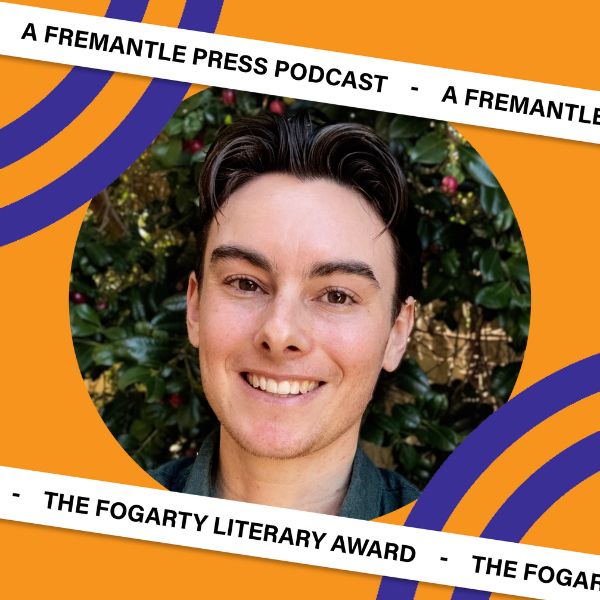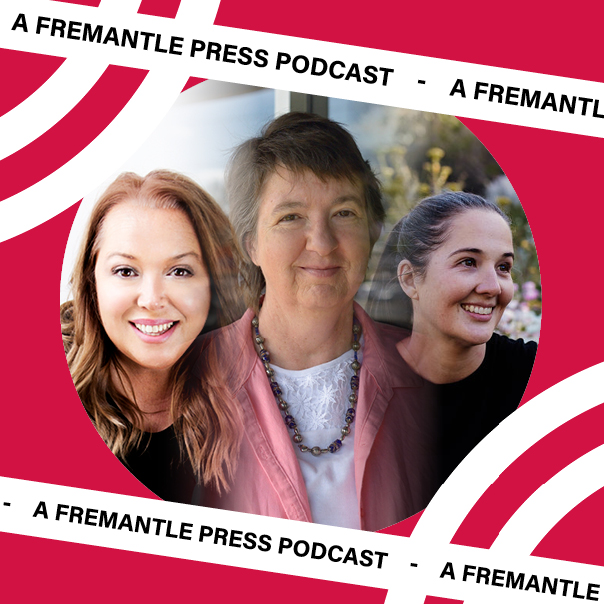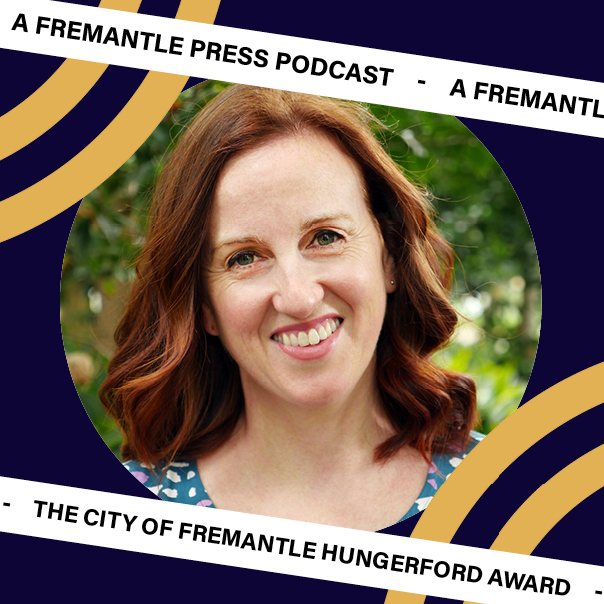Episode Transcript
[00:00:10] Speaker A: Hello and welcome to the Fogarty Literary Award podcast.
Today we are recording on Wolulup in Whadjuk, Noongar Buja. And I'd like to acknowledge our first storytellers along with Noongar elders past and present.
My name is Kathryn Alam. In 2023, I won the Fogarty Literary Award for my novel, the Skeleton House.
The Fogarty Literary Award is proudly sponsored by the Fogarty Foundation, Fremantle Press, and the center for Stories, all local, not for profit organizations which support local writers and wa literacy projects and education projects.
The winner receives a publishing contract with Fremantle Press, a $20,000 cash prize, a residency with the center for Stories, along with a stipend of $1,500.
The generosity from these organizations nurture our local arts community and makes literary dreams come true.
Writing a manuscript to completion is hard enough, and I know for me this prize provided a glimmer of hope, a friendly helping hand into the world of publishing.
Today's guest is Chuckie Raven, talking about their manuscript, Glimmers in the Sea Glass.
But first, I'm here with Georgia Richter, publisher at Fremantle Press.
[00:01:30] Speaker B: It can be really challenging to get a novel with parallel narratives right, but I think that Chuckie Raven has really succeeded with this YA novel. So in Glimmers in the Sea glass, we meet two characters, Sarah and Owen, who are born 20 years apart from and the first storyline begins in a small country town, and then the other opens in the psych ward of Perth's Children's Hospital.
I love the authenticity of both these perspectives as the author explores what traps and what pathways are available to each character in their particular circumstances.
So the dual storyline creates the opportunity for lots of mini cliffhangers, as well as allowing the reader to think about the difference that two decades has made in what it's like to be growing up queer. And of course, one of the rewards also lies in finding out what the connection between these two characters is going to be when their storylines eventually meet.
This novel has got an effortless style and also the feeling of lived experience about it, which I think gives it its own kind of wisdom. And not only young queer readers, but all kinds of readers are going to find things to relate to in this novel.
[00:02:41] Speaker A: Yeah, the dual storyline is a big challenge. Writing one story is plenty to be getting on with, but I love a manuscript where the two storylines are sort of this intricate dance and they kind of dance off each other and create these echoes.
Chuckie Raven is a youth worker and craftsperson living in Nola Mara, Western Australia.
They're the founder and leader of the Perth Pride shed, Perth's first LGBTQIA community shed.
They are passionate about protecting queer kids and through their work with the Freedom center, have met many brilliant young minds who give them endless hope for the future.
Chucky writes stories they wish they'd had growing up. Their debut novel, Glimmers in the Sea Glass, was born out of their own queer experience and their family's experience of living in WA's Southwest.
[00:03:33] Speaker C: Congratulations on getting this far. Welcome.
[00:03:36] Speaker D: Thank you.
[00:03:37] Speaker C: An award like this is a really important milestone. I'd love to hear what it was like when you got the call and found out that you were shortlisted for the Fogarty Literary Award.
[00:03:47] Speaker D: Yeah, I sort of lightly lost my mind.
I got a call from what I thought was a random number and normally I'm quite excited to answer random numbers. I'm strange like that. It's like, oh, who's calling me today? But I was just having a day and I thought, I just can't. I'll wait for it to go to voicemail. And then I thought, hang on a minute. It's around the time that the award, the shortlist, is going to be announced. So I googled the number and went, oh. Oh, that's Fremantle Press. So I was trying to sort of keep my calm as I called back, but as the folks who called me know, I basically lost my mind again. So a few expletives were let out that I was intentionally not getting my hopes up or anything, and it just exploded in my mind. It's just incredible.
[00:04:28] Speaker C: I think the joy that you felt was only just marginally above the joy that the Fremantle Press staff felt when they were able to give you that call.
It just must be the best thing.
[00:04:38] Speaker D: Yeah.
[00:04:39] Speaker C: I would love to hear, in your own words, what your manuscript's about.
[00:04:43] Speaker D: Yeah. So Glimmers in the Sea Glass has a dual narrative. So it's two different storylines, and the first one follows this young, non binary kid called Owen who's living in Perth in 2024. And. And they're sort of grappling with life in the aftermath of surviving suicide. So they're a patient, an inpatient on a mental health ward in the children's hospital. And it's following this way that they have of explaining and coping with their circumstances. They have this thing that they call the chaos, which is a force or entity that follows their dad around and they're sort of wrestling with this idea that it's been passed on to them. It's a very thinly cloaked metaphor for mental health. And generational trauma. And then the other. The storyline follows Sez, who's this you young lesbian kid growing up in Donnybrook, which some listeners may know is a small regional town in the southwest of wa, famed for its apples, and says isn't really out to anybody except for her girlfriend and her brother. She gets a lot of flack for being at least visibly queer and different from the people around her. And she's got her own way of viewing her world and explaining why things are happening the way they are. She had this experience when she was where she had this vision of Joan of Arc appearing to her in the fireplace of her family home. And Joan kind of gave her this prophecy that her life was gonna come to an end around Easter time and that there'd be all these signs that this was the year that it was happening. And so we follow Sez. Most of the time we're with her, it's in the lead up to Easter and Easter itself. And so the novel kind of weaves together these two narratives and they crisscross and intertwine and sort of questions from one are answered in the other. It's not really magical realism, but it's kind of like mystical or spiritual realism.
[00:06:26] Speaker C: I guess I was just thinking it's got these kind of modern day mythology sort of overtones to it, which sounds fascinating.
[00:06:34] Speaker D: Those things kind of came halfway through writing it when I was getting more and more into the mind of each character and trying to think, well, what's their way of describing it? Because I was originally coming at it from a perspective of me describing the situation.
And then I thought about Sez being part of a, like quite a strict Catholic upbringing and how she would use that language to kind of talk about her own struggles. As much as, you know, people who have had experience in therapy and with mental illness use sort of therapy speak and yeah, just kind of ended up being the way that it is.
[00:07:06] Speaker C: Yeah, I mean that's the best part about writing a story, is you get discovered along the way yourself as the writer. And new things open up in front of you.
When you're ready, would you like to share an excerpt? We'd love to hear a bit of Glimmers in the sea glass.
[00:07:22] Speaker D: Donnybrook2002 Dan and me high up in the Norfolk Pine needles whistling in the breeze Our house below Gray white roof, three tiers of lawn and Dan and me hidden from view High up in the treetop the shouting's getting louder growing closer he's in a stinker of a mood today he's not going after Mum. She's just caught in the line of fire. His rage is directed at us, but it can't find its target, can't find us. High up in the needles. Dan's giggling madly, giggling like he knows he'll be found, like he thinks it's funny. We're making it worse. I tell him to shut it, tell him it's his arse that's going to be black and blue if dad finds us. But he just laughs. I'm seven. It's January. I'm missing my two front teeth. The day is hot, the breeze is warm, and if I don't chuck a piss soon, I'm going to die.
Dan tells me to piss down from the tree, tells me to flop it out and lean over one of the branches. I don't have a willy. Dan just giggles, jabs his fingers into my ribs and makes me laugh. My bladder is going to explode. Dan is going to tickle me so hard my bladder will burst. Dad will hear the bang of my bladder and he'll come out raging and find me dead and flopped over a branch. The security screen slams open. Dad's heard the laughter. Shit. Shut up. Shut up. Dan whispers. Get down now.
Dad's staggering down the steep incline. He's full to the brim, pissed as a fart, completely off his tits. His body weight fights him every step of the way. No. Dan calls out. Daniel, get down here. Dad's at the base of the pine tree now, staring up at us. He's in his boxes, hairy bare chest and a belly that sticks out so far I can't see his feet. He looks like an angry human egg. Come and get us, Daniel. I'm not fucking playing. Get down now.
Dan giggles. You can't, can you, Fatty? Pumbaa can't get us. Dad's face is red now. He's an angry, wobbling egg and he can't get us. But I need a piss so bad. I'm gonna die if I don't pee soon.
Dad's sitting at the foot of the tree, beer in his hand and the Sunday paper in his lap. It's becoming a siege situation. Dan and me in the castle tree and dad with his trebuchet fist sitting at the base. I'm serious. I really can't hold it.
Fine, Dan says. Here. He offers me a hand.
Stand up. I've got you. Stand on that branch there.
Okay?
Alright. Now, steady. Pull down your pants and lean back.
Dan and I lean back, out over the drop. Dad's drinking from his stubby, the paper still in his lap. I'm giggling too hard. I can't do it.
Come on, focus. Dan says, giggling just as hard. I squish my face together and clench. I fight the giggles, clench harder. And then it happens right on top of Dad's head.
[00:09:59] Speaker C: That is an excellent piece to read as an excerpt.
[00:10:01] Speaker D: A bit irreverent.
[00:10:03] Speaker C: No, I love it. There is so much going on in that scene and there's a lot underneath the actual events that are happening in the scene.
And obviously that was only from one of the timelines.
[00:10:15] Speaker D: Yeah.
Reading it out, I realized, yeah, it's a very irreverent scene, but it's kind of what I wanted to capture in the novel is that there's this undertone of danger and violence, but both of the characters still have a good sense of humor about it. And it's that, like, the tendency that kids have to try to find the funny side of whatever situation they're in.
[00:10:34] Speaker C: Yeah. No, and it is funny as a grownup, it is funny.
Going back a bit to the dual timeline I'm interested in, what made you decide to tackle that challenge?
[00:10:46] Speaker D: Yeah. So I originally just wrote Owen's narrative, and I was writing it as a standalone novel and. And I finished it and I, like, drafted and redrafted it. And I was sort of at the point where I was like, no, I need to let that rest now because I'm going to over edit it and it's not going to be genuine to what I wrote.
And so I thought, oh, well, you know, I had all these things that were raised. You know, I was thinking about Owen's situation and how living in a city changed that and all this stuff. And I was trying to think of the things that led up to Owen's situation. I got thinking about this character says, and so I just started trying to flesh that out as sort of a project I might tackle down the line. But I got bitten by the bug and I just kind of kept writing it to the point that I finished another novel. And then I was looking at both and I thought, oh, well, I'll just see if they fit together. So I printed out a synopsis of each chapter and I had them laid out on the floor and I was shuffling them to think, like, you know, if I put this here, then it's a really good cliffhanger and we can go into this scene. And it turns out that I write pretty consistently in the same kind of arc of, like, intensity and then dips and stuff like that. And they just meshed really well together. And I found that both stories were kind of improved by having the other one there as a comparison.
[00:11:52] Speaker C: So, like you said, you have these two completed drafts, and then you kind of braided them together. I feel like you'd only tackle that if you had been writing for a while and thinking about writing for a while. So how long have you been a writer?
[00:12:06] Speaker D: So I've only been writing novels for maybe the last three or four years. I've always wanted to write a book, and I just sort of have this philosophy that, like, there's all these things I want to do in my life, and at some point I'm going to do them. They'll just come up like it has. But, yeah, I've always been writing. I used to write a lot of poetry when I was younger, when I was sort of like 10 through 15 and going through a bit of bullying and depression and OCD and all that kind of stuff. And poetry was a nice way for me to explain the way I was feeling. It was like therapy for me on top of therapy. A little bit later in life, I moved into doing slam poetry. And so I was basically using the slam poetry in the same way, just sort of exploring the world and my views around it and trying to make sense of everything. And then, yeah, I sort of written some short stories, and then I just decided I'm just sick of not trying to write something big because I was putting it off. I'm like, how do you write more than 50,000, even 50,000 words? Like, how do you do it? And so, yeah, the last couple years, I just went, bugger it. I'm gonna write. And it might be bad, it might be good. And it seems to have progressively gotten better.
[00:13:08] Speaker C: Yeah, I think the only way to write a novel is to actually just sit down and do it. You can get all the tips in the world, but until you're actually wrestling with your own writing in that volume, it's difficult to.
[00:13:18] Speaker D: Yeah, I found it almost easier at the start to ignore the advice that I was hearing in podcasts about writing and stuff, because, yeah, it just really just comes down to start and then interrogate your writing and keep going. And then, you know, obviously the advice that I'm getting now has been useful now that I'm at the point where I've written a couple of different manuscripts and.
[00:13:37] Speaker C: Yeah, amazing.
Well, thank you so much for being here and sharing more about your manuscript, Glimmers in the Sea Glass.
Listeners, you can meet Chuckie Raven at the 2025 Fogarty Literary Award announcement at Government House ballroom on Tuesday, 3rd of June. Tickets are free and available from the Fremantle Press website.
I'm Katherine Allum and I look forward to joining you in our next Fogarty podcast.
[00:14:07] Speaker B: Sam.


